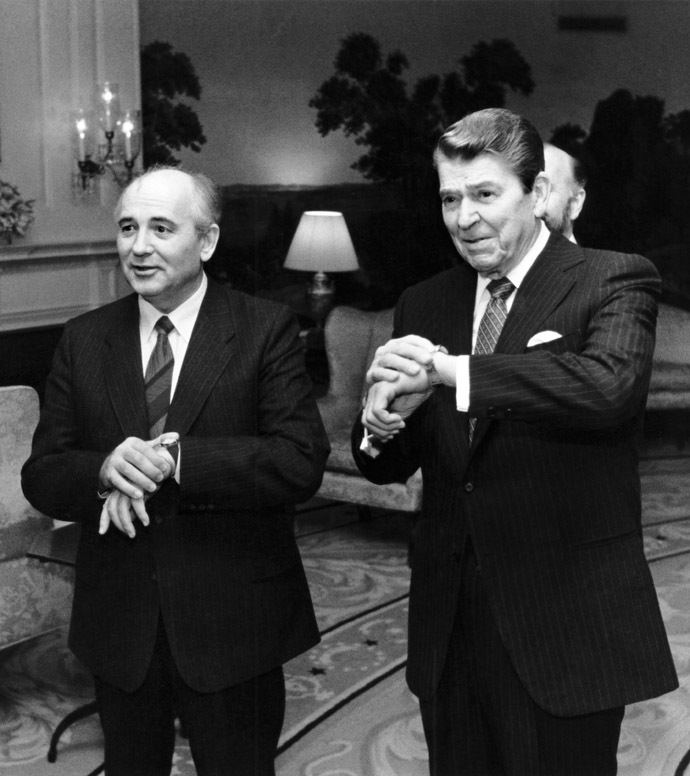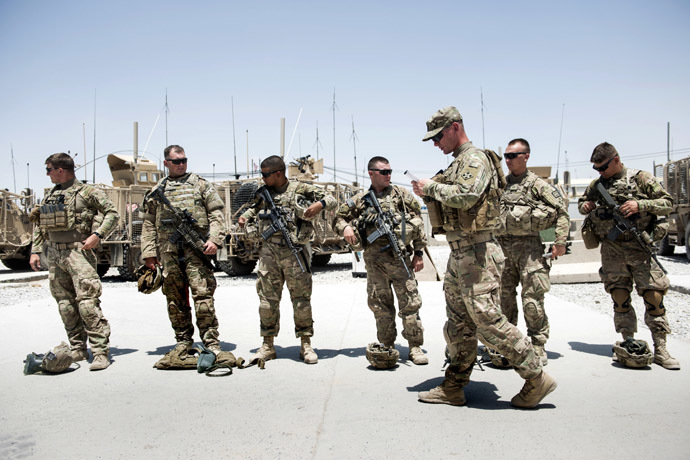Anyone threatening US petrodollar is public enemy No.1

Last Soviet leader, Mikhail Gorbachev, said at the celebration of the fall of the Berlin Wall last weekend that we are facing a new Cold War. What are the geopolitical realities behind this statement?
This weekend I was invited onto RT to do an interview about the commemoration of the 25th anniversary of the fall of the Berlin Wall, particularly focusing on the speech delivered by the last Soviet leader, Mikhail Gorbachev, during his visit to Berlin.
I would like to expand on some of the topics I mentioned - how to encapsulate an alternative geopolitical perspective different from the Western orthodoxy in under four minutes? A task even Monty Python would find challenging!
The first issue was Gorbachev's comments about a new Cold War. I would agree, and this is being fabricated by the USA, as that country always needs an Emmanuel Goldstein figure to justify its military-industrial complex that is bankrupting the country and brutalizing the world, while enriching the US oligarchs to the detriment of civil society everywhere.
The first front line in this new Cold War is the internet. In the 1990s the USA had a golden opportunity - in fact a perfect storm of opportunities. It was the last superpower left standing in a newly unipolar world, history had officially ended and capitalism had triumphed. The Soviet Union had disintegrated and the newly shorn Russia was tottering, its vast national wealth being assiduously asset-stripped by the globalised neocon elite.
Plus, the new world wide web was exponentially growing and the key pioneers were predominantly American companies. After an initially panicked phase of playing catch-up in the 1990s, western spy agencies saw the potential for total mastery of the internet, creating a surveillance panopticon that the KGB or the Stasi could only have fantasized about. With thanks to Edward Snowden, we are now beginning to get glimpses of the full horror of the surveillance under which we all now live.

But it is not all down to the NSA.Building on the old Echelon model, which was so nearly overthrown in Europe back in July 2001, the NSA has suborned, bought and prostituted other western intelligence agencies across Europe to do its bidding.Germany, at the nexus of east and west Europe, remains a front line in this battle, with the BND possibly working unconstitutionally to do the NSA's bidding, even apparently to the detriment of its own national interest. The politicians (some) and hacktivists (many) are fighting back.
But it is the geographical boundaries that have shifted most significantly since the fall of the Wall. Here I need to credit former senior CIA officer, presidential advisor, and current peace activist Ray McGovern, for all the useful information he provided during his various talks and interviews across Europe a couple of months ago.
Ray, a fluent Russian speaker, worked as a Soviet expert for much of his career in the CIA. As such he was privy to the behind-the-scenes negotiating that occurred after the fall of the Wall.When this happened the USA pushed for German reunification but was worried about the 260,000 Soviet troops stationed in the former GDR. They cut a deal with Gorbachev, stating that NATO would not move "one inch" further than Germany after reunification. This the Soviets accepted, and withdrew their troops.
Well, we all know what has happened since. NATO has expanded east at an amazing rate, now encompassing a further 12 eastern European countries including the Baltic States and Poland, which the US has used as a base for an increasing number of "defensive" missile systems. In 2008 NATO also issued a declaration that Georgia and Ukraine would be welcome to join, taking the front line up to the borders of Russia. Coincidentally, both these countries in recent years have been portrayed as the victims of "Russian expansionism."
The Russians are coming! pic.twitter.com/hlAw9aUYKq
— Ian56 (@Ian56789) November 1, 2014
In 2008 Georgia invaded the disputed ethnic Russian region of South Ossetia. Russia moved to protect the people and gave the Georgian military a bloody nose. Anyone remember that? At the time it was portrayed across the Western media as Russian aggression, but the facts have emerged since to disprove this version of events.
Similarly, this year we have seen a violent coup overthrow democratically-elected President Yanukovich of Ukraine when he was inclined to stay within the Russian sphere of influence rather than ally the country more closely to the EU under the asset-stripping austerity measures demanded by the International Monetary Fund. Victoria Nuland, the US Assistant Secretary of State responsible for Europe, was heard to discuss the US had over previous years pumped $5 billion into Ukraine to subvert it, that the new installed Prime Minister would be "their man", and "f**k the EU".
And yet still Russia is blamed for aggression. I am not an apologist for Russia, but the facts speak for themselves even if they are not widely reported in the Western mainstream media.
But why on earth would the US be meddling in Ukraine? Would an expansion of NATO be sufficient excuse in America's self-interested eyes? Probably not.
Which leads me on to a very interesting article by Eric Zuesse. His well-researched and referenced report is that it all comes down to energy supplies once again. When does it not?
The USA has some unsavoury allies in the Middle East, including theocratic dictatorships such as Saudi Arabia and Qatar.Their vast energy reserves are not only essential to the USA, but also the trading of these reserves in the petrodollar monopoly is vital to propping up the bankrupt US economy.
Russia, at the moment, is the primary energy supplier to the EU - the world's largest market. Iran, a Russian client, wanted to build a pipeline via Syria with President Assad's approval, to exploit this vast market. However, Saudi Arabia, Qatar and the USA apparently have other plans involving a pipeline from Qatar via Syria to Europe.
Hence the urgent need to overthrow Assad and put a Sunni puppet government in place, more palatable to those pulling the strings. Qatar's preferred candidate of choice would be more moderate, such as the Muslim Brotherhood. Saudi, on the other hand, would have no compunction about installing a hard-line fundamentalist regime in place - up to and including ISIS. And thus the murder, mayhem and human suffering erupting across the region now. This is an appalling real life example of the horrors inherent in Brzezinski's psychopathic.
It is widely accepted truism today, over a decade after the "war on terror" began, that all the wars in the Middle East were launched to protect America's oil and energy interests. Less well known is the country's desperate scramble to protect the petrodollar monopoly. If that fails, the dollar will no longer remain the world's reserve currency and the USA is financially screwed.
If you look at all the recent wars, invasions, and "humanitarian interventions" that have resulted in collapsed countries and anarchy across whole regions, it is clear that beyond oil and gas the key issue is money: pre-2003 Iraq tried to trade what oil it could in euro not dollars and Saddam Hussein was deposed; despite being welcomed briefly back into the international fold, once Libya's Colonel Gaddafi began to talk about establishing an African gold dinar currency, backed by Libya's oil wealth to challenge the petrodollar, he too was toppled; Assad wanted to facilitate energy pipelines to Europe for Russia and Iran, and he was attacked; even Iran tried to trade its energy reserves in euro, and lo and behold it was almost invaded in 2008; and finally Russia itself trades some of its energy in rubles.
As people say, always follow the money.
So, in my view, this is the current geopolitical situation. Russia is now strong enough, with its domination of Europe's energy supply, its backing of Middle Eastern countries that want to break away from the US sphere of influence, and its investment development bank with other BRICS countries, that it can challenge the US hegemony.
However, threaten the petrodollar monopoly and thereby the very financial solvency of the United States of America and you are suddenly Public Enemy No 1.

As I said, I am by no means an apologist for Russia - I tell it like I see it. To Western sensibilities, Russia has some serious domestic issues to address: human rights abuses during the brutal Chechen war; its suspected involvement in the death by polonium-210 poisoning of KGB defector Alexander Litvinenko in London in 2006; its overly-punitive drug laws; and human rights abuses against dissidents, the LGBT community, and journalists. Yet the West has merely mouthed platitudinous objections to all these issues.
So why now is Russia being internationally excoriated and penalized for actions that it is not responsible for? Over the last few years it has looked statesmanlike compared to the US and its vassal states: it was not involved with the Libya fiasco, it has given safe haven to NSA whistleblower Edward Snowden, and it halted the rush to yet another disastrous western war in Syria.
Nor, to my Western European sensibilities, are America and its acolytes too pristine either, with their mass surveillance, presidentially-approved kill lists, kidnapping, torture and drone bombings target illegal wars. Not to mention their domestic addiction to gun ownership and the death penalty, but that's another story....
Yet the US media-enabled propaganda machines justify all of the above and demonize another country, creating yet another fresh bogeyman to justify yet more "defense" spending.
The Russian bear is being baited, increasingly surrounded by yapping curs. I thought this sport had been made illegal hundreds of years ago, at least in Europe - but obviously not in the dirty realm of international politics.It is a marvel the bear has not lashed out more in the face of such provocation.
There was a chance for peace when the Wall came down 25 years ago. If the US had upheld its side of the gentlemen's agreement about not expanding NATO, if the neocon predators had not pounced on Russia, and if closer integration could have been achieved with Europe, the future could have been rosy.
Unfortunately, I have to agree with Gorbachev - we are indeed facing a new Cold War, and this time it is of America's making. But Europe will bear the brunt, through trade sanctions, energy shortages and even, potentially, war. It is time we Europeans broke away from our American vassalage and looked to our own future.
The statements, views and opinions expressed in this column are solely those of the author and do not necessarily represent those of RT.
The statements, views and opinions expressed in this column are solely those of the author and do not necessarily represent those of RT.













